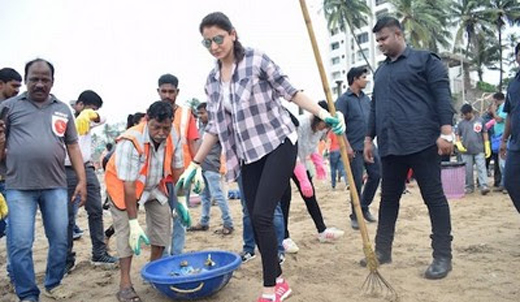Rights groups welcome UN criticism of India’s sanitation drive
Mangalore Today News Network
New Delhi, Nov 18 , 2017 : Rights groups have backed a United Nations finding that India is abusing people’s rights in a rush to implement a national sanitation program.

UN Special Rapporteur Leo Heller criticized India in a Nov. 10 report after a two-week long review of the Swachh Bharat Abhiyan (clean India mission) conducted at the invitation of the government.
The U.N called for inclusion of a human rights "perspective" in the improvement of water and sanitation services.
The sanitation drive, which Prime Minister Narendra Modi launched on Oct. 2, 2014, aims to end open-defecation by Oct. 2, 2019, the 150th anniversary of the birth of Mahatma Gandhi.
The goal is to ensure the building of 12 million toilets in Indian villages at a projected cost of US$30 billion.
The project aims to boost construction of both household and community-owned toilets.
However, Heller said the government was using "aggressive and abusive practices" to meet project deadlines.
For example, his report said there had been cases of officials cancelling food subsidy cards or cutting electricity to people who did not have a toilet at home.
Heller also said that eliminating open defecation should not only be about building toilets.
It required education to change behavior as well as a sufficient water supply to facilitate safe, low-cost latrines.
His comments came amid media reports that 60 percent of the toilets the government has built under the project have no proper water supply, making them largely unusable.
Heller’s report also stated that the sanitation drive should not violate the rights of manual scavengers, who clear excreta from millions of latrines, or the rights of ethnic minorities and people living in remote rural areas.
The Indian government described Heller’s report as biased and inaccurate.
The government had the highest commitment to human rights in general and particularly in the water supply and sanitation sectors, according to an official statement.
Rights groups working for manual scavengers said Heller’s report should be an “eye opener” for the government.
Manual scavengers are from the lowest ebb of the Dalit community, formerly known as untouchables, and they are discriminated at all levels, even barred from entering shops and temples, said activist Bezwada Wilson.
Wilson said there had been little effort to introduce suction pump and other technologies so that humans would no longer be needed to clean toilets manually.
Activist Ajay Kumar said that just in the national capital, New Delhi, some 70 people have died since 1994 clearing out toilet excreta by hand.
Little was done to enforce an official ban on the practice, Kumar told media.
- Special train between Indore and Mangaluru to clear festive rush
- Land owners demand denotification of lands notified for highway widening in Padua village
- Daiva ritual linked to Rishab Shetty’s vow conducted as per tradition, shrine committee clarifies
- Mangaluru: Youth found dead by hanging at Padil
- Vande Bharat Express likely from Bengaluru to Mangaluru, Udupi and Karwar
- Kasaragod: Local body election results to be announced today
- Udupi: Skeletal remains of unidentified man found in Ambalpady
- Uppinangady: Wild elephants destroy crops in Bajathoor village
- Sullia youth killed in hit-and-run in Mysuru
- Union Cabinet announces Census 2027, to be held in two phases
- Mangaluru: Illegal cattle slaughter continues, three carcasses found near riverbank
- Hejmady Kodi fishing harbour project sees 87% progress, says Union Minister quoting Karnataka government
- Belthangady: Shop owner booked under POCSO for sexual harassment of minor girl
- Ex-Air Force officer arrested in Assam on charges of spying for Pakistan
- 2001 Parliament attack anniversary: PM Modi, Rahul Gandhi pay tribute to fallen heroes
- Lionel Messi’s blink and Miss Kolkata event angers fans, bottles thrown
- 3 US lawmakers move resolution to end President Trump’s 50% tariffs on India
- Bengaluru man electrocuted while trying to save pet parrot worth 2.5 lakhs
- Red fort blast: Delhi court sends 3 doctors, preacher to 12 days jail
- Samajwadi to Majawadi: BJP slams Siddaramaiah on flight travel expenses
- IndiGo crisis: DGCA suspends 4 Flight Operations Inspectors
- Former Lok Sabha Speaker Shivraj Patil dies At 90
- Indian artefacts among 600 high value items stolen from UK museum
- Andhra bus with devotees crashes into ravine due to heavy fog, 9 dead
- IndiGo offers travel vouchers worth Rs 10,000 to passengers severely impacted during Dec 3-5
- Mangaluru Student Goes Missing; Ullal Police Register Case
- APD Foundation Joins WHO Civil Society Commission
- Daiva’s prediction comes true: Janardhan Reddy walks free from jail
- Skills and Competencies Take Center Stage at MSN Dialogue Series
- Court remands Maoist Lakshmi to six-day police custody
- Sandhya Shenoy honored with Society for Materials Chemistry Medal-2024
- White Cornus Apartment in Mangaluru
- City girl wins first place in state-level spell bee competition
- Alleged ‘Love Jihad’ Case in Mangaluru: Woman left home voluntarily, says police
- Girl fatally struck by reckless two-wheeler near Belman
- New residential complex for the judges inaugurated in Mangaluru
- Absconding accused nabbed after 8 years
- Truck with cylinders turns turtle in Beltangady
- Bhoota Kola artist dies of cardiac arrest
- Development of the country should be our goal: Ganesh Karnik
- CITY INFORMATION
- TRAVEL
- TOURIST INFORMATION
- HEALTH CARE
- MISCELLANEOUS




 Write Comment
Write Comment E-Mail To a Friend
E-Mail To a Friend Facebook
Facebook Twitter
Twitter  Print
Print 

